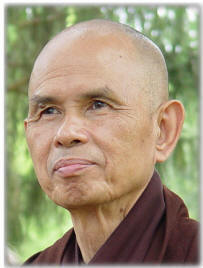|
Thich Nhat Hanh
 Zen
Master, poet, peace and human rights activist, Thich Nhat Hanh was born in
central Vietnam in 1926 and joined the monkhood at the age of 16. In Saigon in
the early 1960s, he founded the School of Youth for Social Services (SYSS), a
grass roots relief organization that rebuilt bombed villages, set up schools and
medical centers, resettled homeless families, and organized agricultural
cooperatives. Rallying some 10,000 student volunteers, the SYSS based its work
on the Buddhist principles of non-violence and compassionate action. Despite
government denunciation of his activity, Nhat Hanh also founded a Buddhist
University, a publishing house, and an influential peace activist magazine in
Vietnam. Zen
Master, poet, peace and human rights activist, Thich Nhat Hanh was born in
central Vietnam in 1926 and joined the monkhood at the age of 16. In Saigon in
the early 1960s, he founded the School of Youth for Social Services (SYSS), a
grass roots relief organization that rebuilt bombed villages, set up schools and
medical centers, resettled homeless families, and organized agricultural
cooperatives. Rallying some 10,000 student volunteers, the SYSS based its work
on the Buddhist principles of non-violence and compassionate action. Despite
government denunciation of his activity, Nhat Hanh also founded a Buddhist
University, a publishing house, and an influential peace activist magazine in
Vietnam.
Exiled from Vietnam, he traveled to the U.S. where he made the case for peace
to federal and Pentagon officials including Robert McNamara. He may have changed
the course of U.S. history when he persuaded Martin Luther King, Jr. to oppose
the Vietnam War publicly, and so helped galvanize the peace movement. The
following year, King nominated him for the Nobel Peace Prize. Subsequently Nhat Hanh led the Buddhist delegation to the Paris
Peace Talks.
Often referred to as the most beloved Buddhist teacher in the West, Thich
Nhat Hanh's teachings and practices appeal to people from various religious,
spiritual, and political backgrounds. Nhat Hanh offers a practice of
"mindfulness" that is beneficial for people of all faiths, by helping
us resist and transform the speed and violence of our modern society. His life
and teachings have deeply influenced millions of people, including scores of
luminaries in different fields: politician Jerry Brown, civil rights champion
Martin Luther King, Jr., eco-activist Joanna Macy, and Catholic mystic Thomas
Merton -- to name a few.
He has published more than 100 titles, including more than 40 in English: Peace
is Every Step, Being Peace, Touching Peace and many more. His books are
published by Parallax Press.
Text courtesy of The Community for
Mindful Living.
|
